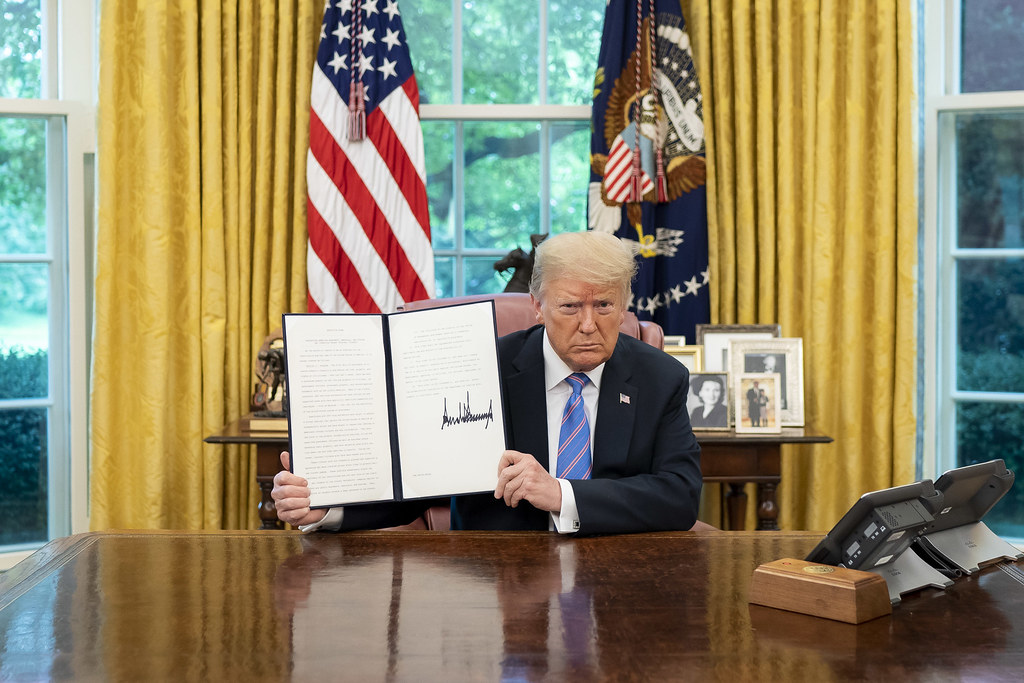On Feb. 5, President Donald Trump signed Executive Order 14201, titled “Keeping Men Out of Women’s Sports,” aiming to prohibit male-to-female transgender athletes from participating in girls’ and women’s sports across all education levels. The order threatens to revoke federal funding from any educational institution that allows transgender girls to compete on girls’ teams, citing violations of Title IX. However, it does not mention transgender boys playing on boys’ teams.
In response, the U.S. Department of Education has urged the National Collegiate Athletic Association (NCAA) and the National Federation of State High School Associations (NFHS) to revoke awards, records, and titles previously earned by transgender women in female athletic competitions. This directive aims to restore recognition to cisgender female athletes who, according to the Department, whose “recognition was wrongfully credited to biological males.”
The NCAA has complied with the executive order by updating its policy to restrict women’s sports competitions exclusively to athletes assigned female at birth, effective immediately. NCAA President Charlie Baker claims the order provides a “clear national standard” following previously conflicting state laws and court decisions.
The Pennsylvania Interscholastic Athletic Association (PIAA) has announced that it will comply with Executive Order 14201 by updating its policies to align with federal guidelines. Following this decision, PIAA removed their transgender policy and amended the language in their handbook, requesting that schools identify students by “sex” rather than “gender”. This effectively limits transgender female athletes’ ability to participate in girls sports within PIAA-affiliated schools.
This shift has sparked debate among athletes, coaches, and advocacy groups regarding the balance between inclusivity and competitive fairness. The Philadelphia School District shared its plans to not comply with the policy, while numerous advocates and parents have called for changes to the policy, stating that it violates the Pennsylvania Human Relations Act and PA’s equal rights amendment.
For SCASD, Board Policy 250R provides guidance on how the district will support transgender and gender-expansive students. The policy also provides directions specific to athletics, stating that “Participation in competitive athletics, intramural sports, athletic teams, competitions, and contact sports shall be facilitated in accordance with the Pennsylvania Interscholastic Athletic Association bylaws.”
SCASD Athletic Director Chris Weakland shared how changes aligned with the PIAA would be implemented.
“As far as an athletics lens, we take our lead from our school district administration and the PIAA. So, those two organizations follow each other and work with each other. So, we’re not going to do anything that violates the PIAA, nor [State College Area] School District, or the federal law or state law,” Weakland said. “We’re just going to follow their lead. Right now, a lot of those changes are still up in the air [and are] undeveloped.”
Weakland shared that the PIAA will be holding a conference in late March; however, he was unsure if and to what extent the topic would be discussed. He emphasized that discussions about the topic were necessary before changes could occur.
“I think a lot of conversation and discussion, not only at the state level with the PIAA, but then also within the district, at the district level [are a part of the next steps]. I think there’s still a lot of drafting and understanding of this new policy that needs to take place before we jump in and realize we jumped too far, or not far enough,” Weakland said.
Currently, there is limited information regarding the prevalence of male-to-female athletes competing at the collegiate and high school levels. In December 2024, NCAA President Charlie Baker told a senate panel that there were “less than 10” transgender athletes in the NCAA; however, the specific number of male-to-female athletes was not stated. The number of transgender high school athletes is unknown.
Weakland shared that the executive order “hasn’t had an impact up to this point” on SCASD, but did not share whether there were transgender or male-to-female transgender athletes in the district or competing in the PIAA.
Junior Vinny Wild, a transgender rights activist, commented on the impact of these policies, questioning their scope.
“I think it’s sad and also kind of pointless to be putting so much effort into the banning of trans women in assigned female at-birth, sports because there’s no reason to be putting so much time and effort into a law that really does not affect anyone on a personal or like, safety-wise level,” Wild said.
The executive order has prompted legal challenges. Two transgender teens from New Hampshire, Parker Tirrell and Iris Turmelle, have filed a lawsuit against the Trump administration, arguing that the order unconstitutionally discriminated against transgender individuals. Represented by Gay & Lesbian Alliance Against Defamation (GLAAD) Law, ACLU of New Hampshire and Goodwin Laws, the plaintiffs contend that excluding transgender athletes from sports causes significant harm and violates their rights.
“I think [the lawsuit] was justified because I think the banning of accommodations for trans people in general and getting rid of that is pointless…making the livelihood of a specific group of people worse just because your ideals don’t align with that. I think it’s kind of sad and has no reason for it. I think that those people had every right to file a lawsuit against Trump because it’s discriminatory and we shouldn’t be going back and regressing as a country,” Wild said.
The impact of this executive order on high school and college athletics is multifaceted. Institutions may face the dilemma of choosing between compliance with federal directives to maintain federal funding and adherence to state laws that support transgender athletes’ participation. SCASD currently receives $1.620 million in federal funding, representing 1% of total funding. This could lead to inconsistencies in athletic policies across states and schools, potentially resulting in legal disputes and challenges in implementing sports programs.
School Board Policy 000 outlines how SCASD will comply with federal laws. The policy states: “Board policies and administrative regulations are not intended and shall not be construed to supersede or preempt any applicable laws.”
Deirdri Houck, SCASD’s Title IX deputy coordinator, explained this policy further. “If there is law that supersedes policy, the district will abide by the law,” Houck said.
In the case of Executive Order 14201, the district is required to follow the federal law and adjust their current policies accordingly. Currently, the district policy planning committee is working as needed to adjust policies.
The U.S. Department of Education has been directed to give districts an interpretation of any new policies by April 30, and SCASD is monitoring the department for directions and guidance on executive orders. These changes happen quickly, and the district is actively following the department’s laws and policies.
Michelle Simpson, the district’s Human Resources Executive Director and Compliance/Title IX Officer, described the policy change process. Simpson works with the school board’s policy development committee.
“I can speak specifically to the Title IX regulations updated in August 2024,” Simpson said. “After [the August 2024 Title IX] updates, the district policy committee took a look at our policies 103, 103.1, and 104, which are discrimination, harassment affecting students, students with qualified disabilities, and then also that affecting staff. So we reviewed those policies at the policy development committee, a committee of the board, and then recommended revisions based on the Pennsylvania School Board Association. Recommendations to the policy were approved on Oct. 21, 2024. And that policy encompassed [the district’s response to] discriminatory behavior toward the qualifying groups that I mentioned earlier.”
As changes occur, Weakland emphasized how the district is working to support students.
“We always try to provide a caring and responsive environment for our kids and our student athletes, whether it’s in the classroom or in the athletic field,” Weakland said. “That won’t stop. That doesn’t change in any way, shape, or form. What that may look like may take on different forms, but we’re always going to strive to care for and be responsive to our student athletes.”
Editor’s note: Information provided from interviews with Deidri Houck, Michelle Simpson, and Chris Weakland used in this article are accurate as of March 7, 2025.










![The Varsity Boys Volleyball team poses for a photograph after sweeping Altoona 3-0 in the District 6 Championship game. “[Winning the championship] means a lot and shows the work we have put in all year paying off. Still, we aren't celebrating too much as we still have games ahead of us,” junior Derrick Campbell said.](https://lionsdigest1.com/wp-content/uploads/2025/05/EFP_8864-1200x798.jpg)




